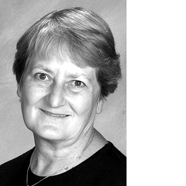Command to love God, neighbor could not be more challenging

By: Sister Rachel Bergschneider, OSB
Thirtieth Sunday in Ordinary Time/Oct. 26
Exodus 22:20-26; Psalm 18:2-3,3-4,47,51; 1 Thessalonians 1:5c-10; Matthew 22:34-40
“You shall love the Lord, your God, with all your heart, with all your soul, and with all your mind. This is the greatest and the first commandment. The second is like it: You shall love your neighbor as yourself. The whole law and the prophets depend on these two commandments.” (Matthew 22:39-40)
Sounds simple doesn’t it?
In reality, the command to love — both God and neighbor — could not be more challenging. It is the real grit of the message of Jesus. There is no end or completion to the command. There is always more to love. It costs us all that we have; it never ceases in its demand. Jesus’ message is not for the complacent.
Today’s first reading, taken from Exodus, puts “flesh” on this message of love: “You shall not molest or oppress an alien; you shall not wrong any widow or orphan; if you lend money to one of your poor neighbors, you shall not exact interest from him or her; if you take your neighbor’s cloak, return it before sunset.” We may say, “That doesn’t sound so difficult. I don’t do any of those things.”
But, upon reflection, how many of us oppress by our tongue, our exclusions, our turning from someone who needs us? How many of us lend with interest or expectation of payback — monetary interest or emotional reward? How many of us take from the storehouse of another’s self-esteem or even real goods and go our merry way?
NO EXCEPTION TO LOVE
There are no exceptions to love. We cannot choose who we bestow our love on or when we will love. In a society where convenience and choice are paramount “virtues,” the challenge is to go out of ourselves “in season and out of season, when it is convenient and when it is inconvenient.” (2 Timothy 4:2)
There is a story in Tolstoy’s book, “The Two Pilgrims.” Two Russians who set out on a pilgrimage to Jerusalem were intent on being present at the solemn Easter festivities. One had his mind so set on the journey’s end and object that he would stop for nothing and take thought for nothing but the journey. The other, passing through, found people to be helped at every turn and actually spent so much time and money along the way that he never reached the Holy City. But something came to him from God which the other missed, and something came through him from God into the lives of men which the other failed to find in the great Easter celebration. (William P. Merill)
St. Martin of Tours understood this clearly. Martin, a cavalry officer, was leading his troops when he came upon a poorly clad beggar suffering from the frigid temperatures. Moved by the man’s suffering, Martin took off his own elegant cape and put it on the beggar. He was about to go on his way when he was stopped by an amazing sight: the beggar was Jesus Christ, searching among people for evidence of the charity He had said was the greatest virtue.
If the love of God is the center of our lives, we will shape ourselves in the image of the one we love, God, whose vision allows us to see our neighbor as God sees: as a beloved friend of God. When we see our neighbors as God sees them, we will treat them with the clarity of God’s compassion. When we are inspired to imitate God’s care for the weak and vulnerable, to hear the cries God hears and to see people as God sees them, then our blindness falls away. We are transformed by God to do what God does for us — love unconditionally.
—–
Sister Rachel Bergschneider, OSB, is a member of the Sisters of St. Benedict of St. Mary Monastery in Rock Island. She serves as pastoral associate at St. Thomas the Apostle Parish in Peoria Heights.





